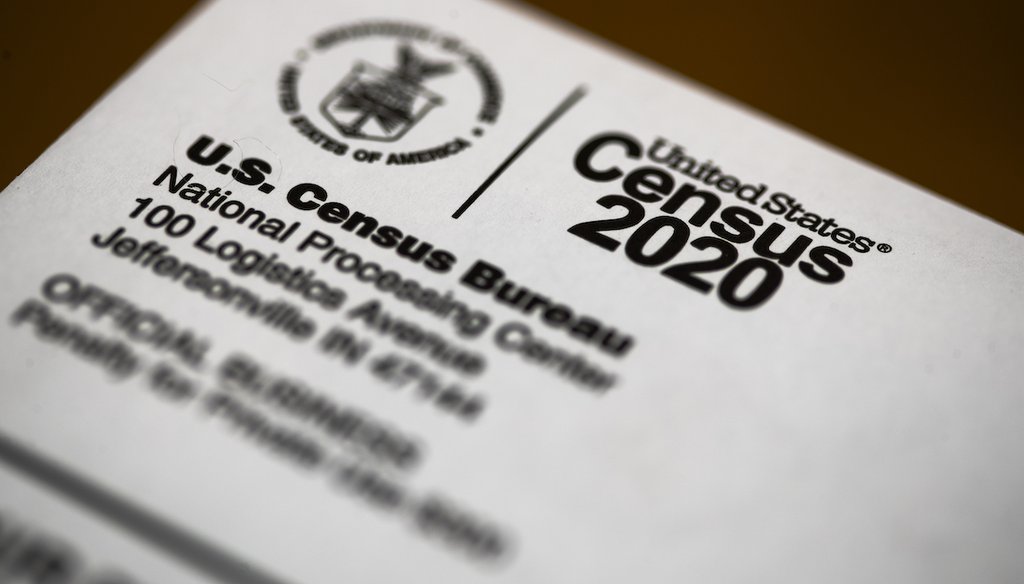Stand up for the facts!
Our only agenda is to publish the truth so you can be an informed participant in democracy.
We need your help.
I would like to contribute

A photo shows an envelope containing a 2020 census letter mailed to a U.S. resident in Glenside, Pa. (AP)
If Your Time is short
- Noncitizens have been included in the U.S. Census count that determines how many congressional seats each state receives since 1790.
A bill that would exclude noncitizens from the U.S. Census count that determines the number of congressional seats in each state has spurred misleading claims online.
"In case you missed it, every single Democrat in the House just voted for illegal immigrants to count toward representation in Congress and the Electoral College," a woman in an Instagram video says. She continues, "If the legal citizens won’t vote for you, and having the dead people attempt to vote for you isn’t working, bring in, just bring in the illegals."
The video includes a screenshot of an article from the Not the Bee, a news website that is an offshoot of satirical website The Babylon Bee.
This post was flagged as part of Meta’s efforts to combat false news and misinformation on its News Feed. (Read more about our partnership with Meta, which owns Facebook and Instagram.)
The full article references the Equal Representation Act, a bill that would add a citizenship question to the U.S. Census to exclude noncitizens from the population count that determines congressional apportionment. Noncitizens are now counted in the census and have been for more than 200 years.
No Democrats voted in favor of the bill. The bill’s critics said excluding noncitizens from Congressional apportionment violates the Constitution.
The U.S. Census has always counted noncitizens, and in voting against the Equal Representation Act, Democrats opted to keep the system as is. The bill passed with a majority in the House of Representatives and has been sent to the Senate.
The U.S. House of Representatives has 435 seats. Each state automatically receives one seat, and the remaining seats are allocated based on population size as reported in the U.S. Census, which is conducted every 10 years. The number of electoral votes allocated to each state is also based on the census.
Thomas Wolf, democracy initiatives director at the nonprofit Brennan Center for Justice, said the U.S. Census has counted every person living in the U.S., regardless of citizenship status, since the first census was conducted in 1790. He said the only exceptions were Native Americans who were not taxed and therefore were not counted, and enslaved people who were counted as three-fifths of a person until the passage of the Constitution’s 14th Amendment.
Since 1790, the census has also been used to determine the number of seats each state has in the House of Representatives.
Dan Vicuña, the redistricting and representation director at Common Cause, a voting rights group, told PolitiFact, "Making residents of the United States invisible for the purposes of congressional apportionment would be a clear violation of the U.S. constitution."
The 14th amendment, which was ratified in 1868, says representatives should be apportioned to states based on the "whole number" of people in each state, and it does not make exceptions for people’s immigration status.
The Equal Representation Act is not the first time politicians have tried to change who’s counted in the census. Former President Donald Trump unsuccessfully tried in 2020 to exclude noncitizens from the census count and congressional apportionment.
Wolf sent us an amicus brief that census historians wrote when Trump’ tried changing redistricting processes; the brief said excluding immigrants in the U.S. illegally from congressional apportionment violates the Constitution.
PolitiFact found that excluding noncitizens from congressional apportionment would not necessarily benefit Democratic-led states. Republican-led states have experienced significant increases in immigrant populations in recent years.
Our Sources
Instagram post (archived), May 10, 2024
Not the Bee, Every single Democrat in the House just voted for illegal immigrants to count towards representation in Congress and the Electoral College, May 9, 2024
Congress.gov, H.R.7109 - Equal Representation Act, accessed May 17, 2024
Office of the Clerk, United States House of Representatives, Roll Call 193 | Bill Number: H.R. 7109, May 8, 2024
United States Census Bureau, About Congressional Apportionment, accessed May 17, 2024
National Archives, Distribution of Electoral Votes, accessed May 202, 2024
Phone interview, Thomas Wolf, Brennan Center for Justice, director of democracy initiatives, May 17, 2024
United States Census Bureau, Historical Perspective, May 20, 2024
Email interview, Dan Vicuña, Common Cause, director of redistricting and representation, May 20, 2024
Congress.gov, Fourteenth Amendment, accessed May 20, 2024
The Washington Post, The audacious timeline of Trump’s failed plot on the census and citizenship, Jan. 18, 2022
The White House, Memorandum on Excluding Illegal Aliens From the Apportionment Base Following the 2020 Census, July 21, 2020
Brennan Center for Justice, Brief of Amici Curiae historians of the Census in support of appellees, accessed May 20, 2024
PolitiFact, More immigrants equal better odds for Democrats after the next census? Why those claims are flawed, March 25, 2024
Pew Research Center, How removing unauthorized immigrants from census statistics could affect House reapportionment, July 24, 2020
The Leadership Conference on Civil and Human Rights, Save the 2030 Census and Respect the Constitution, Vote No on H.R. 7109, April 11, 2024
Common Cause, Common Cause Urges "No" Vote on So-Called Equal Representation Act, May 8, 2024




























